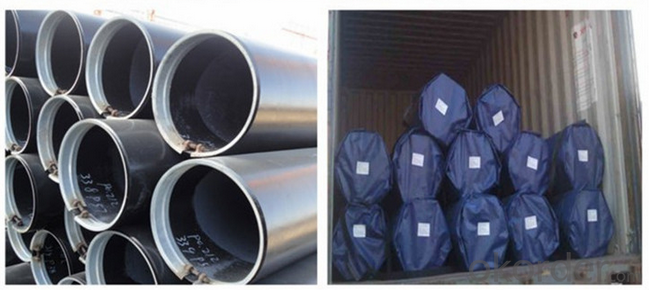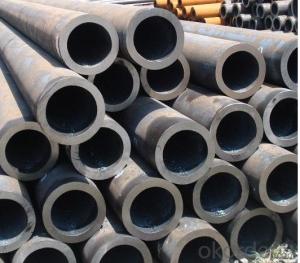ASTM A335 Seamless Ferritic Alloy-Steel Pipe for High-Temperature Service
- Loading Port:
- Shanghai
- Payment Terms:
- TT OR LC
- Min Order Qty:
- 1000 kg
- Supply Capability:
- 10000 kg/month
OKorder Service Pledge
OKorder Financial Service
You Might Also Like
Packaging Detail: | Bundle or Container or as per customers requirement. |
Delivery Detail: | within 25 days after we receive an irrevocable L/Cor 30% deposit |
ASTM A335 Seamless Alloy-Steel Pipe
Standard: BS 1139, BS 3059-2, JIS G3454-2007
Grade: 10#-45#, 15NiCuMoNb5, 10Cr9Mo1VNb
Detailed introduction to ASTM A335 seamless alloy steel pipe:
ASTM A335 seamless alloy steel pipe

some mechanical property
Standard | Model | Tensile Strength (Mpa) | Yield Strength (Mpa) | Elongation Rate (%) | Hardness |
GB3087 | 10 | 335~475 | ≥195 | ≥24 | / |
20 | 410~550 | ≥245 | ≥20 | / | |
GB5310 | 20G | 410~550 | ≥245 | ≥24 | / |
20MnG | ≥415 | ≥240 | ≥22 | / | |
25MnG | ≥485 | ≥275 | ≥20 | / | |
15CrMoG | 440~640 | ≥235 | ≥21 | / | |
12Cr2MoG | 450~600 | ≥280 | ≥20 | / | |
12Cr1MoVG | 470~640 | ≥255 | ≥21 | / | |
12Cr2MoWVTiB | 540~735 | ≥345 | ≥18 | / | |
10Cr9Mo1VNb | ≥585 | ≥415 | ≥20 | / | |
ASME SA210 | SA210A-1 | ≥415 | ≥255 | ≥30 | ≤143HB |
SA210C | ≥485 | ≥275 | ≥30 | ≤179HB | |
ASME SA213 | SA213 T11 | ≥415 | ≥205 | ≥30 | ≤163HB |
SA213 T12 | ≥415 | ≥220 | ≥30 | ≤163HB | |
SA213 T22 | ≥415 | ≥205 | ≥30 | ≤163HB | |
SA213 T23 | ≥510 | ≥400 | ≥20 | ≤220HB | |
SA213 T91 | ≥585 | ≥415 | ≥20 | ≤250HB | |
SA213 T92 | ≥620 | ≥440 | ≥20 | ≤250HB | |
DIN17175 | ST45.8 | 410~530 | ≥255 | ≥21 | / |
15Mo3 | 450~600 | ≥270 | ≥22 | / | |
13CrMo44 | 440~590 | ≥290 | ≥22 | / | |
10CrMo910 | 480~630 | ≥280 | ≥20 | / |
Chemical Composition (%) | ||||||||||||||
Grade | C | Si | Mn | P | S | Cr | Mo | Cu | Ni | V | Al | W | Nb | N |
P11 | 0.05~0.15 | 0.5~1.0 | 0.3~0.6 | ≤ 0.03 | ≤ 0.03 | 1.0~1.5 | 0.5~1.0 | |||||||
P12 | 0.05~0.15 | ≤ 0.5 | 0.3~0.61 | ≤ 0.03 | ≤ 0.03 | 0.8~1.25 | 0.44~0.65 | |||||||
P22 | 0.05~0.15 | ≤ 0.5 | 0.3~0.6 | ≤ 0.03 | ≤ 0.03 | 1.9~2.6 | 0.87~1.13 | |||||||
P5 | ≤ 0.15 | ≤ 0.5 | 0.3~0.6 | ≤ 0.03 | ≤ 0.03 | 4.0~6.0 | 0.45~0.65 | |||||||
P91 | 0.08~0.12 | 0.2~0.5 | 0.3~0.6 | ≤ 0.02 | ≤ 0.01 | 8.0~9.5 | 0.85~1.05 | ≤ 0.4 | 0.18~0.25 | ≤ 0.015 | 0.06~0.10 | 0.03~0.07 | ||
Mechanical Properties | ||||||||||||||
Grade | Tensile strength(MPa) | Yield strength(MPa) | Elongation(%) | Impact energy(J) | Hardness | |||||||||
P11 | ≥ 415 | ≥ 205 | ≥ 22 | ≥ 35 | ≤ 163HB | |||||||||
P12 | ≥ 415 | ≥ 220 | ≥ 22 | ≥ 35 | ≤ 163HB | |||||||||
P22 | ≥ 415 | ≥ 205 | ≥ 22 | ≥ 35 | ≤ 163HB | |||||||||
P5 | ≥ 415 | ≥ 205 | ≥ 22 | ≥ 35 | ≤ 187HB | |||||||||
P91 | 585~760 | ≥ 415 | ≥ 20 | ≥ 35 | ≤ 250HB | |||||||||
P92 | ≥ 620 | ≥ 440 | ≥ 20 | ≥ 35 | 250HB | |||||||||
FAQ:
1) why you chose us ?
Professional Manufacturer and supplier of Steel pipe
More than 14 years’ professional producing experience
We can get the lowest ex-factory prices. The price are quite reasonable and it is lower than our commercial peers. also, we can guarantee the qualities of our products.
BV, ISO certificates and SGS test can be provided to assure the quality of our products.
2) Our minimum order quantity:
10 Metric Tons or one 20ft or 40ft Container.
3) How about the Delivery Time?
The steel pipe will be produced since we getting your deposit by T/T or Your original L/C. For normal size, some stocks in our factory now, we can supply once you need.
4)What kind of payment does your company support?
T/T, 100% L/C at sight, Cash, Western Union are all accepted.
5) Do you charge for the samples?
According to our company principle, we just charge for samples, you pay for the freight /courier charge.
6) Main market:
Mid East, South America, Africa, Southeast Asia, India etc
- Q:How are steel pipes used in stadium construction?
- Steel pipes are commonly used in stadium construction for various purposes such as structural support, roofing, and plumbing systems. They provide strength and durability to the overall structure of the stadium, allowing it to withstand heavy loads and adverse weather conditions. Steel pipes are also used for the installation of HVAC systems, water supply lines, and drainage systems within the stadium.
- Q:What does "1.5" steel tube mean?
- 1.5 inch [1 1/2 steel pipe, outer diameter 48.3mm, 1.5 inches, refers to the pipe bore is approximately the inner diameter (25.4x1.5 = 38.1mm). [DN40] the specific parameters of the steel pipe are as follows;The average wall thickness is: 3.5mm;The minimum wall thickness is 3.06mm,Nominal diameter is 40mm,External Jing is 48.3mm,
- Q:How are steel pipes protected against seismic activities?
- Steel pipes are protected against seismic activities through various measures. One common method is the use of seismic restraint systems, which include bracing, clamps, and supports that are designed to withstand the forces generated during an earthquake. Additionally, pipes can be coated with corrosion-resistant materials to enhance their durability and resistance to seismic events. Regular inspection and maintenance of the pipes are also essential to ensure their continued protection against seismic activities.
- Q:Are steel pipes suitable for underground sewage lines?
- Yes, steel pipes are suitable for underground sewage lines. They are strong, durable, and resistant to corrosion, making them an excellent choice for sewage systems.
- Q:What are the different types of steel pipe supports for seismic applications?
- There are several types of steel pipe supports commonly used for seismic applications, including sway braces, rigid braces, snubbers, and restraints. Sway braces are designed to absorb lateral movement and provide flexibility during seismic events. Rigid braces, on the other hand, offer rigid support and resist movement. Snubbers are used to dampen pipe vibrations and prevent excessive movement. Restraints are used to anchor and limit the movement of the pipe during seismic activity.
- Q:How are steel pipes used in the construction of tunnels?
- Steel pipes are used in the construction of tunnels for various purposes such as drainage, ventilation, and transportation of utilities. They provide structural support, ensuring stability and strength, while also allowing for the efficient flow of water, air, and other essential resources within the tunnel.
- Q:Can steel pipes be used in marine environments?
- Indeed, the usage of steel pipes is viable in marine environments. Steel, being a robust and sturdy material, possesses the capability to endure the severe conditions prevalent in marine surroundings, encompassing saltwater exposure, wave impacts, and corrosion. Nevertheless, it is imperative to meticulously choose the appropriate steel variant and implement suitable protective measures to avert corrosion. Stainless steel and corrosion-resistant alloys are often employed in marine applications due to their exceptional resistance against corrosion and ability to withstand continuous saltwater exposure. Furthermore, the application of coatings such as epoxy or zinc can be an effective means of fortifying steel pipes against corrosion. Consistent maintenance and inspections are also pivotal in ensuring the durability and functionality of steel pipes in marine settings.
- Q:Can steel pipes be coated for additional protection?
- Yes, steel pipes can be coated for additional protection. Coatings such as epoxy, polyethylene, or zinc can be applied to steel pipes to enhance their durability, corrosion resistance, and longevity.
- Q:What is the difference between steel pipes and concrete pipes?
- Steel pipes and concrete pipes differ in their composition, construction, and characteristics. Steel pipes are made from steel, whereas concrete pipes are made from a mixture of cement, sand, aggregate, and water. Steel pipes are known for their strength, durability, and resistance to corrosion, making them suitable for high-pressure applications and underground installations. Concrete pipes, on the other hand, are renowned for their affordability, ease of installation, and resistance to fire. They are commonly used in stormwater drainage systems and sewerage networks. Overall, the choice between steel pipes and concrete pipes depends on the specific requirements of the project, such as budget, load-bearing capacity, and environmental factors.
- Q:Are steel pipes suitable for wastewater treatment facilities?
- Yes, steel pipes are suitable for wastewater treatment facilities. Steel pipes are known for their durability, strength, and resistance to corrosion, making them ideal for handling the corrosive and harsh nature of wastewater. Additionally, steel pipes can withstand high pressure and temperature variations, ensuring the efficient and reliable transportation of wastewater within the facility.
1. Manufacturer Overview |
|
|---|---|
| Location | |
| Year Established | |
| Annual Output Value | |
| Main Markets | |
| Company Certifications | |
2. Manufacturer Certificates |
|
|---|---|
| a) Certification Name | |
| Range | |
| Reference | |
| Validity Period | |
3. Manufacturer Capability |
|
|---|---|
| a)Trade Capacity | |
| Nearest Port | |
| Export Percentage | |
| No.of Employees in Trade Department | |
| Language Spoken: | |
| b)Factory Information | |
| Factory Size: | |
| No. of Production Lines | |
| Contract Manufacturing | |
| Product Price Range | |
Send your message to us
ASTM A335 Seamless Ferritic Alloy-Steel Pipe for High-Temperature Service
- Loading Port:
- Shanghai
- Payment Terms:
- TT OR LC
- Min Order Qty:
- 1000 kg
- Supply Capability:
- 10000 kg/month
OKorder Service Pledge
OKorder Financial Service
Similar products
New products
Hot products
Related keywords






























